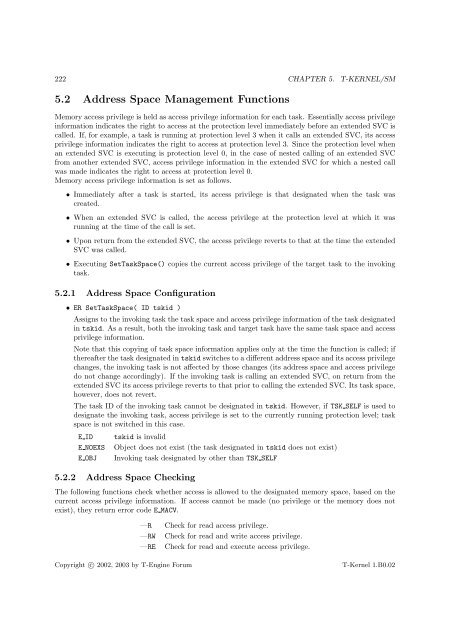T-Kernel Specification (1.B0.02)
T-Kernel Specification (1.B0.02)
T-Kernel Specification (1.B0.02)
Create successful ePaper yourself
Turn your PDF publications into a flip-book with our unique Google optimized e-Paper software.
222 CHAPTER 5. T-KERNEL/SM<br />
5.2 Address Space Management Functions<br />
Memory access privilege is held as access privilege information for each task. Essentially access privilege<br />
information indicates the right to access at the protection level immediately before an extended SVC is<br />
called. If, for example, a task is running at protection level 3 when it calls an extended SVC, its access<br />
privilege information indicates the right to access at protection level 3. Since the protection level when<br />
an extended SVC is executing is protection level 0, in the case of nested calling of an extended SVC<br />
from another extended SVC, access privilege information in the extended SVC for which a nested call<br />
was made indicates the right to access at protection level 0.<br />
Memory access privilege information is set as follows.<br />
• Immediately after a task is started, its access privilege is that designated when the task was<br />
created.<br />
• When an extended SVC is called, the access privilege at the protection level at which it was<br />
running at the time of the call is set.<br />
• Upon return from the extended SVC, the access privilege reverts to that at the time the extended<br />
SVC was called.<br />
• Executing SetTaskSpace() copies the current access privilege of the target task to the invoking<br />
task.<br />
5.2.1 Address Space Configuration<br />
• ER SetTaskSpace( ID tskid )<br />
Assigns to the invoking task the task space and access privilege information of the task designated<br />
in tskid. As a result, both the invoking task and target task have the same task space and access<br />
privilege information.<br />
Note that this copying of task space information applies only at the time the function is called; if<br />
thereafter the task designated in tskid switches to a different address space and its access privilege<br />
changes, the invoking task is not affected by those changes (its address space and access privilege<br />
do not change accordingly). If the invoking task is calling an extended SVC, on return from the<br />
extended SVC its access privilege reverts to that prior to calling the extended SVC. Its task space,<br />
however, does not revert.<br />
The task ID of the invoking task cannot be designated in tskid. However, if TSK SELF is used to<br />
designate the invoking task, access privilege is set to the currently running protection level; task<br />
space is not switched in this case.<br />
E ID<br />
E NOEXS<br />
E OBJ<br />
tskid is invalid<br />
Object does not exist (the task designated in tskid does not exist)<br />
Invoking task designated by other than TSK SELF<br />
5.2.2 Address Space Checking<br />
The following functions check whether access is allowed to the designated memory space, based on the<br />
current access privilege information. If access cannot be made (no privilege or the memory does not<br />
exist), they return error code E MACV.<br />
—R Check for read access privilege.<br />
—RW Check for read and write access privilege.<br />
—RE Check for read and execute access privilege.<br />
Copyright c○ 2002, 2003 by T-Engine Forum<br />
T-<strong>Kernel</strong> <strong>1.B0.02</strong>












![[8] 2002 e-business-strategies-for-virtual-organizations](https://img.yumpu.com/8167654/1/190x257/8-2002-e-business-strategies-for-virtual-organizations.jpg?quality=85)


